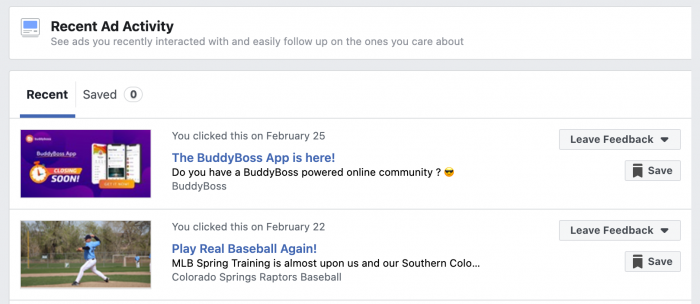If Facebook is right, we’re in the process of entering a very different online world. Privacy as the goal, advertising will suddenly seem very “different” to users. Will they like what they see?
When the iOS 14 ATT prompt rolls out to all users in “early Spring,” they will be given two options: 1) Allow the app to track your activity across apps and websites to provide personalized advertising or 2) Don’t allow tracking. This prompt, most importantly for Facebook advertisers who run ads for mobile web, will be shown for Facebook and Instagram app users.
Of course, this isn’t just about iOS 14. This is a trend. We’re entering a less personalized world.
If ads are less personalized, they will be less relevant. If they are less relevant, they’re less likely to be effective. According to Facebook:
Our studies show, without personalized ads powered by their own data, small businesses could see a cut of over 60% of website sales from ads.
To non-advertisers, this quote means nothing. Why should you care whether advertisers are profitable?
The Future of Privacy-Altered Advertising
We’re entering a world of greater online privacy, where pixels and tracking become less effective. Without tracking, an advertising platform like Facebook knows less about you. They don’t know the websites you visit or the products you buy.
To some, that would be a good thing.
Tracking allows businesses to reach people who have visited their website or expressed interest in specific products. It allows advertisers to show ads to people that they may actually want to see. Ads that solve problems or answer questions they’ve had.
By removing tracking, you can expect to see fewer of these relevant ads.
You Click on Ads
Like it or not, ads are a part of your Facebook news feed experience. At their best, well-targeted ads can add to your experience. At their worst, poorly-targeted ads will take away.
Ideally, ads will show up at just the right time. You were just searching for this solution. Or it features a topic that you’re passionate about. You click, and maybe you don’t even realize that it was an ad.
I know, I know. The claim has always been “I never click on Facebook ads.” You’re a freaking liar.
I click on ads, and it’s not because I’m an advertiser trying to make a point. The reality is that even I’m not completely aware of how often I’m clicking them.
But you can find this information in Recent Ad Activity, which is in the bookmarks sidebar of Facebook’s mobile app and desktop site. Here, you’ll see the ads you’ve engaged with during the past three months.

I’ve engaged with 54 ads during that time. Granted, I didn’t engage to buy in all cases. Sometimes, I was simply curious about the comments. There are a few I simply don’t remember.
But there absolutely are products I bought from ads in that list. Others I was interested in that I wouldn’t have considered without seeing those ads.
You Will Still See Ads
When people complain about ads, they seem to think that an ad-less utopia is a possibility. If you opt-out of tracking, you are still going to see ads.
In the fourth quarter of 2020, more than $27 Billion of Facebook’s total $28 Billion in revenue came from advertising. This is how Facebook makes money. This is why you can use Facebook for “free.”
The ads aren’t going anywhere. In fact, the ads may start becoming more noticeable as they become less relevant and more annoying. You may even swear you’re seeing more.
Instead, it’s just that those ads are more likely to suck.
What Will Users Do?
So, this is where it will get interesting. You may see an ad once every 3-5 posts in your news feed (I just performed a very unscientific experiment and found that to be the case for me). That’s a pretty juicy percentage of your experience.
If those ads are relevant — particularly if they reflect sources you already consume on a regular basis — you may hardly notice them. But if they aren’t relevant, your experience will be negatively impacted.
It’s not that you need ads to improve your experience on Facebook. But you do need good ads that don’t take away from your experience.
Will users notice this change? How will they react? Can we presume that they will act less often on ads? Will they complain more about the ads? Will they make the connection that this is due to a lack of tracking and personalization?
And the primary question: Will they use Facebook less often as a result?
Again, the chunk of content that is actually promoted is not trivial. This contributes significantly to your experience, whether we like it or not.
An Advertiser’s Perspective
It’s really easy to ignore an advertiser’s perspective related to online privacy. I totally understand that.
But, I also think there’s a basic misunderstanding of what an advertiser does and has access to.
If you allow tracking, there’s not some evil advertiser scrolling through a list of people to target who has visited their and other similar websites. They aren’t picking you out by name and looking at your embarrassing browsing habits.
Maybe this is a strawman. But I get the sense that some people think this way (maybe the definition of a strawman). It’s just not that sophisticated.
As a publisher, I have the Facebook pixel code on my website. Facebook is able to anonymously connect visitors to my site to users on Facebook. That way, I can create highly targeted ads based on the pages you visited, things you bought, and other activities.
But, I never see who did any of that. To be honest, I don’t care. I just want to reach the people who are likely to respond to my ads.
As an advertiser, maybe I’ve become numb to it. But, I see the value in targeted ads — not just as an advertiser, but as a user. I want to see ads that are relevant to me. I don’t want to see garbage that has nothing to do with me.
Maybe you don’t trust Facebook, and that truly is understandable. But I hope that users understand what the advertiser’s role actually is in this process.
Jumping in a Time Machine
The future of online advertising may actually look a whole lot like the past. Less relevant. Less personalized. More annoying.
Of course, advertisers will need to adjust to remain profitable. Facebook will need to evolve to maintain their revenue growth. Other companies may see an opportunity to fill a need and develop solutions.
Still, it’s going to be more difficult to create highly relevant ads — or, more accurately, to create ads that we can confidently say will be of interest to our audience.
It’s going to be like 10 years ago. Not the good part of 10 years ago when everyone loved Facebook and it was fresh and awesome and exciting. I’m talking about all of the crappy ads we saw that we wished would go away.
From a user’s perspective, that future is disappointing. From an advertiser’s perspective, it’s a bit scary. It means we can’t keep doing what we’ve always done. Most importantly, we can’t do things like we did 10 years ago.
And that is a topic for another day…
VIDEO
I did something different and recorded a version of this blog post as both a Pubcast episode and a video. Let me know if it’s something you want me to continue!
Your Turn
What are your thoughts on the future of online advertising and how users will react to it? Do they realize what they are inviting?
Let me know in the comments below?






